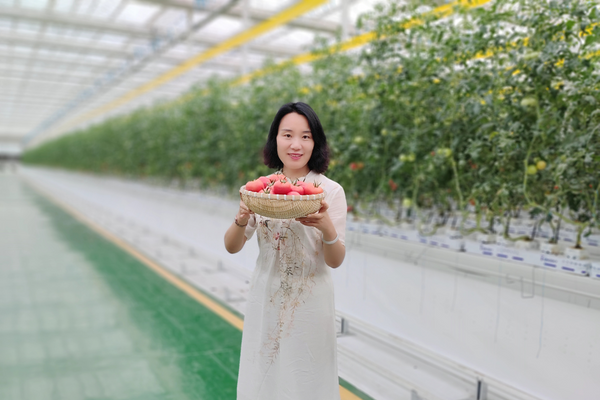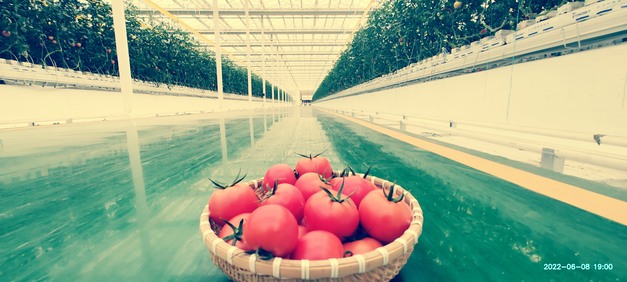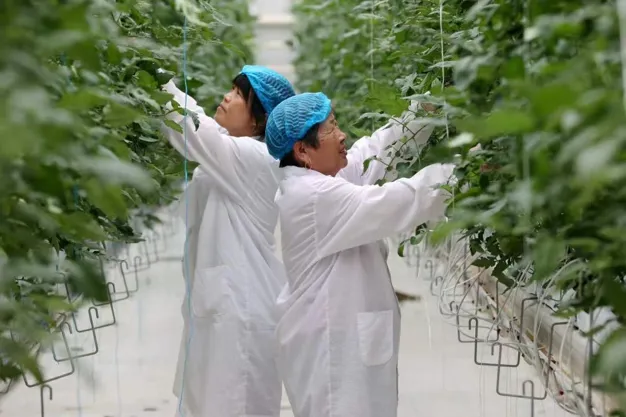Tsingsky Technology (Tsingsky) was established in February 2014. It has been focusing on comprehensive solutions for tomato and vegetable factories centered on thin-skinned, sandy-fleshed tomatoes and integrated the whole cycle management from design, equipment, and engineering to operation and maintenance. Currently, there is a production base that spans over 4-hectare in Moganshan, Deqing, Huzhou, Zhejiang, and the Shuimu Mengdian Carbon Neutralization Demonstration Plant located in Mengzhuang Town, Huixian City, Henan Province is the first agricultural carbon neutralization demonstration farm in China.

Wang Xiaoqing, the founder, said, "Agriculture, as a pillar industry, is not purely economical. Tsingsky has been advocating three values of agriculture: economic value, social value, and ecological value. Deqing County, Zhejiang Province, has promoted GEP-measured agricultural enterprises, fully considering ecological value, economic value, and social value when developing enterprises, including population stability and emergency protection. In order to reduce the carbon footprint, we position ourselves as localized production and localized sales and calculate the entire mileage of producing agricultural products. The sales radius should preferably be within 15 kilometers. In addition, our greenhouse tomatoes mainly focus on the emergency protection of urban vegetables that are unsuitable for long-distance transportation and long-time storage and prioritize ensuring the supply to schools."

"The development of agriculture needs to fully respect the local natural conditions in order to achieve sustainable development. I have been insisting on over-summer production for eight years, and we found that the groundwater temperature has always been 18 degrees, and the soil temperature has been stable at 18-24 degrees. Therefore, water source and ground source heat pumps are good energy solutions if there is no waste heat from the power plant as a supply. Agricultural production needs to be adapted to local conditions, for which we also propose a concept called 'Flexible Energy Management of Agriculture.' Combining more energy sources such as ground sources, water sources, air sources, natural gas, and biomass energy according to the actual situation can increase the COP (Coefficient of Performance) to the maximum. At present, our COP has reached a maximum of 16. That is, one kilowatt-hour of electricity can achieve an energy efficiency of 16 times. In addition, we are also discussing the DC conversion of greenhouse motors. In the future, more photovoltaics will be generated, and the photovoltaic power does not need to be converted into alternating current. Therefore, the efficiency of DC motors will be about 40% higher than that of AC motors."

"From the perspective of the carbon footprint of the entire cycle of greenhouses. I think glass greenhouses will become the mainstream of horticulture in the long run, and plastic greenhouses need to be replaced every three to five years. In addition, in the future, global agriculture will face many challenges brought by climate change, such as heavy rain, hail, and strong wind. Glass greenhouses are more resistant to abnormal weather. Also, the next 5 to 10 years should be the market for fruit and vegetable greenhouses. The shelf life of leafy vegetables is particularly short. With the slow development of the global economy, cash crops such as small tomatoes and strawberries will not become mainstream, and people's livelihood security and vegetable baskets will be the core. The global economy is facing a consumption downgrade, and products that guarantee basic life will become rigid needs. In the next five years, China will face a very rapid professional division of labor. For example, there will be a group of professional water and fertilizer, biological control, and other specialized companies."
"While innovating agricultural technologies, we are also actively promoting the progress of systems related to agriculture. In February 2022, Tsingsky also promoted the first bankable loan for glass greenhouses in China. Because agricultural land in China is leased from the nation, which is different from overseas countries such as the Netherlands, where their land is privately owned, it is very difficult for us to take the assets on the leased land to the bank as collateral after leasing the land. We made a lot of efforts and became the first glass greenhouse mortgage loan in China. The overall mortgage amount has reached 80 million, and the first loan was issued in March 2022."
"Agriculture is not simple and requires a heart of awe. It is an industry that requires very strong systems engineering and interdisciplinary capabilities and requires the integration of capital, management, technology, finance, law, planting, and market content. The most difficult one is the human problem, which requires not only knowledge and ability but also a strong sense of social responsibility and a spirit of altruism, and we look forward to more new generations joining in to promote the development of the industry" Wang concluded.
For more information:
Tsingsky Technolog
Wang Xiaoqing
wxq@tsingsky.com
www.tsingsky.com
